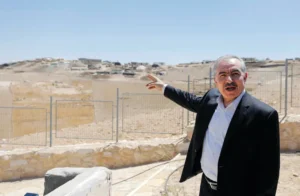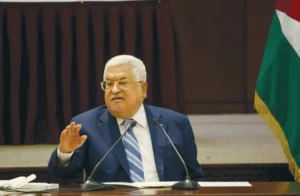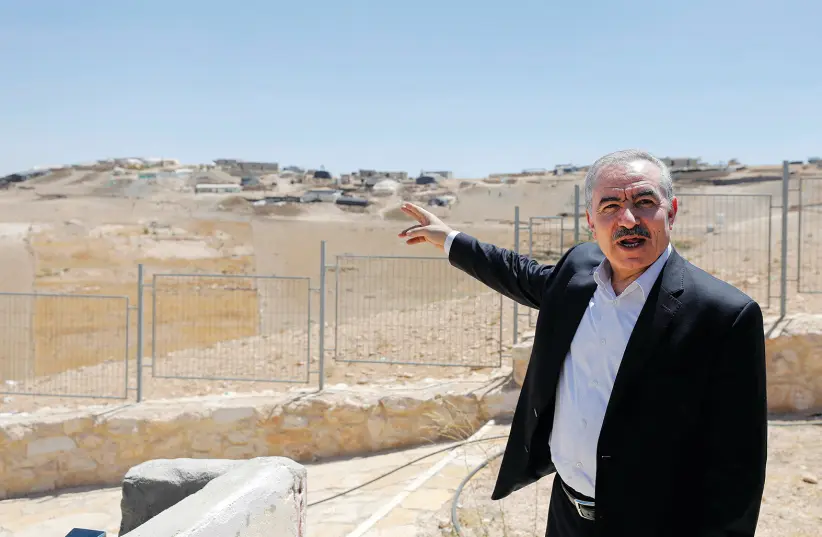PALESTINIAN AFFAIRS: The PA is concerned that the Palestinian issue will be sidelined in the wake of a new Middle East security alliance.

On the eve of US President Joe Biden’s visit to Israel and Saudi Arabia, both the Palestinian Authority and its rivals in Hamas have good reason to be worried.
The PA and its leader, Mahmoud Abbas, are concerned that the Palestinian issue will be sidelined in the wake of the talk of a new Middle East security alliance that would see Israel and some Arab countries, including Saudi Arabia, come together to confront Iran and its terrorist proxies.
For some time now, the rapprochement between Israel and some Arab countries has been keeping Abbas and the PA leadership up at night. They see it as a violation of the 2002 Arab Peace Initiative, according to which the Arabs would establish normal relations with Israel only after a “full Israeli withdrawal from all the territories occupied since 1967… and the establishment of a sovereign independent Palestinian state… with East Jerusalem as its capital.”
Although Biden is scheduled to meet Abbas in Bethlehem, the PA leader is aware that the US president’s visit to the region is mainly aimed at establishing the new security alliance, discussing the possibility of promoting normalization between Israel and Saudi Arabia and strengthening US-Saudi relations.
The Palestinians are not expected to be part of the security alliance. Their primary goal is to make sure the growing cooperation between Israel and the Arab countries does not come at the expense of the Palestinian issue. “President Abbas is not opposed to the security alliance,” said a senior Palestinian official in Ramallah. “He’s just telling the Americans and the Arabs that the alliance should not divert attention from the Palestinian cause.”

As part of his effort to keep the Palestinian issue at the top of the agenda of the Biden administration and the international community, Abbas traveled earlier this week to Amman, where he held talks with Jordan’s King Abdullah. As far as Abbas is concerned, his talks with the Jordanian monarch were successful. The king assured him that despite his support for the proposed alliance, he would make a big effort to ensure the Palestinian issue is not “marginalized” during the Biden visit.
Still, Abbas is worried the Biden administration has no real intention to fulfill most of its promises to the Palestinians, including the reopening of the US consulate in Jerusalem, which was closed by the Trump administration in 2018. In addition, Abbas and other Palestinian officials in Ramallah have expressed deep disappointment with the Biden administration for its alleged failure to exert pressure on Israel to halt settlement construction and refrain from unilateral actions that could “sabotage” the prospects of achieving a two-state solution.
Palestinian officials argue that the Biden administration’s continued “bias” in favor of Israel and failure to carry out its promises to the Palestinians is undermining the PA leadership’s credibility in the eyes of its people and playing into the hands of the extremists, especially Hamas.
“The US does not want to put any pressure on Israel,” said Mahmoud al-Aloul, deputy chairman of Fatah.
“[The US] keeps telling us that we need to be patient because the political situation in Israel is unstable.”
Mahmoud al-Aloul
Walid al-Awad, a member of the Palestinian Central Council, one of the key decision-making institutions of the PLO, said the Palestinians should reject Biden’s “suspicious” visit and make it clear they won’t allow themselves to continue falling victim to “American deception.”
Awad and other Palestinian officials have been demanding that the PA leadership carry out its threats to halt security coordination with Israel and renounce all signed agreements between the Palestinians and Israelis. But they know that Abbas, whose popularity among the Palestinians is on the wane, is not eager to cut off his ties with Israel. While he has lost the support of the majority of the Palestinians, Abbas continues to enjoy the backing of the US and the European Union.
Political Palestinian poll
A PUBLIC opinion poll published this week by the Ramallah-based Palestinian Center for Policy and Survey Research (PCPSR) indicated a significant drop in support for Abbas’s ruling Fatah faction and a similar drop in support for the two-state solution.
The results of the poll also revealed a rise in support for a return to an armed intifada and majority support for the recent terrorist attacks inside Israel.
If new presidential elections were held today, Hamas leader Ismail Haniyeh would receive 55% of the votes, while Abbas would get only 33%, according to the poll. The percentage of Palestinians who want the 86-year-old Abbas to resign has risen from 73% three months ago to 77%.
Another disturbing finding for Abbas: 65% of the Palestinians are opposed to dialogue with the US administration under President Joe Biden.
The results of the poll show that a vast majority of the Palestinians have no confidence in Abbas and the PA leadership, do not see the US as an honest broker in the conflict with Israel and support Hamas and armed attacks against Israel.
Abbas, however, is not oblivious to the sentiments on the Palestinian street. In fact, he does not seem to care much about what the Palestinian public says or wants. Last year, he called off the presidential and parliamentary elections, to the dismay of many Palestinians. Moreover, he does not appear keen on ending his rivalry with Hamas, which has resulted in the emergence of two separate Palestinian entities in the West Bank and Gaza Strip.
This is in addition to the fact that Abbas has been running the PA as an authoritarian regime, refusing to share powers or even consult with others on major issues concerning the Palestinian issue. He has even alienated some of his loyalists by appointing Hussein al-Sheikh to the top position of secretary-general of the PLO. The appointment boosts Sheikh’s chances of succeeding Abbas as president of the PA.
It’s already obvious that the next PA president will not be chosen through a general election, mainly due to the split between the West Bank and Gaza Strip and mounting tensions among the top brass of the Fatah leadership. Several veteran Fatah officials are said to be vehemently opposed to the appointment of Sheikh, arguing that he does not have the credentials to step into the shoes of the PA president.
“Abbas is always keen on appeasing the Americans, Europeans and Israelis more than tending to the needs of his people,” said a senior Fatah official who previously served as a minister in the PA cabinet. “How can he complain that Biden is not fulfilling his promises to the Palestinians when he himself is doing the same? How many times has Abbas promised to halt security coordination with Israel? How many times has he promised and threatened to cancel all signed agreements with Israel? How many times has he promised to end the conflict between Fatah and Hamas? How many times has he promised to hold general elections?”
During the meeting with Biden, Abbas is expected to repeat his call to the US administration to work toward paving the way for creating a “political horizon” that would lead to the resumption of the stalled peace talks with Israel, according to Palestinian sources. This is part of Abbas’s strategy to put the Palestinian issue back at the center of the world’s attention. From Abbas’s point of view, if Saudi Arabia joins the Abraham Accords, the Palestinians may drop even further off the radar of the Arab world than where it currently stands.
But even if Biden reopens the US consulate in Jerusalem, which previously served as a diplomatic mission to the Palestinians, this is unlikely to bolster Abbas’s standing among his own people. The controversy surrounding the consulate is not at the top of the Palestinian public’s list of priorities. Rather, most Palestinians are worried about the security situation in the West Bank, the harsh economic situation and Israeli measures in Jerusalem, including at al-Haram al-Sharif (Temple Mount).
And the Palestinians do not seem to care about any “political horizon” with Israel, at least not under the current circumstances when many of them have lost confidence in any peace process.
Hamas’ Middle East alliance
HAMAS, FOR its part, is also concerned about the idea of establishing a new Middle East alliance. The Hamas leadership is convinced that the security cooperation between Israel and the Arab countries aims to undermine Iran’s growing influence in the region and deal a blow to the “axis of resistance” against Israel.
As part of an effort to disrupt Biden’s upcoming visit, Hamas leader Ismail Haniyeh flew last week from Qatar to Lebanon, where he held meetings with Hezbollah Secretary-General Hassan Nasrallah and leaders of several Palestinian and Lebanese extremist organizations.
Iran and its Palestinian and Lebanese proxies believe the proposed security alliance in the Middle East is part of a “Zionist-American-Arab conspiracy” to facilitate the integration of Israel in the region. They are particularly worried that the alliance’s main goal would be to diminish the power of Hamas and Hezbollah and end Iran’s intervention in the internal affairs of Yemen, Iraq, Syria and Lebanon.
Judging from the statements of its leaders, Hamas’s current strategy is to encourage violent clashes between Palestinians and Israel in the West Bank and Jerusalem, while preserving the unofficial ceasefire in the Gaza Strip. At this stage, Hamas is obviously not interested in, nor prepared for, another round of fighting with Israel.
Hamas knows that increased tensions and violence in the West Bank and Jerusalem further undermine the credibility of Abbas and the PA leadership among the Palestinians. As far as Hamas is concerned, the death of each Palestinian in clashes with the IDF is another nail in the coffin of the PA leadership and any “political horizon” with Israel. The daily IDF raids on Palestinian cities, villages and refugee camps are increasing the anger and frustration not only against Israel, but also against Abbas and the PA leadership.
Like Abbas, the leaders of Hamas are also worried about their group’s growing isolation in the Arab world. In an attempt to shift attention to the Gaza Strip, Hamas has renewed the talk about a possible prisoner exchange deal with Israel by releasing a video of Israeli-Arab citizen Hisham al-Sayed, who has been held captive by the terror group since he crossed into the Gaza Strip in 2015.
The purpose of the video is to put the issue of a prisoner swap back on the agenda ahead of Biden’s visit to the region. Hamas is hoping to send a message to the Americans, the Arabs and Israel to the effect that the terror group remains a major and relevant player in the Palestinian arena and that it holds the key to security and stability.
By raising the issue of the prisoner swap, Hamas is also hoping to score points with the Palestinian public by showing that it is the only party working to secure the release of Palestinian prisoners held in Israeli prisons at a time when Abbas is not doing anything in this regard. Hamas is well aware that securing a prisoner exchange agreement would increase its popularity among the Palestinians.
It’s hard to find a single Palestinian who believes Biden’s visit to the region will yield positive change for the Palestinians, especially in light of the recent collapse of the ruling coalition in Israel.
The day after Biden leaves, Abbas will realize the current stalemate with Israel is likely to remain intact, at least until the next Israeli elections, which are scheduled for four months from now. Moreover, Abbas and Hamas will wake up to a new Middle East in which the Arabs continue to shift their attention from the PA/Hamas-engineered Palestinian plight to their own pressing problems. •

